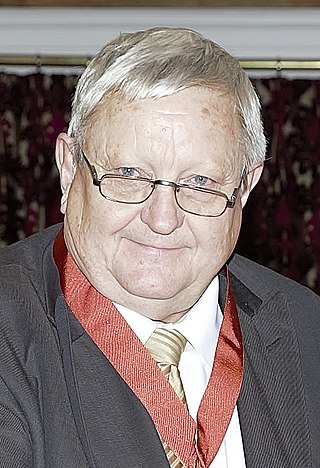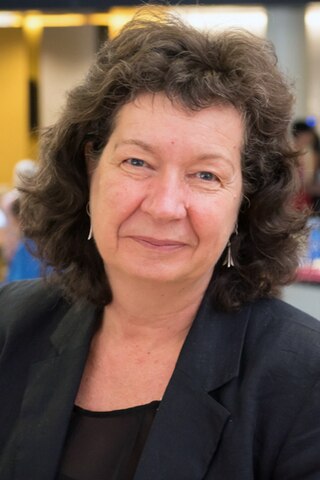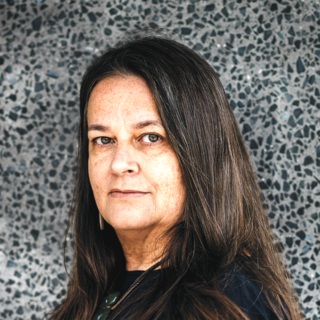Related Research Articles

The Rutherford Medal is the most prestigious award offered by the Royal Society of New Zealand, consisting of a medal and prize of $100,000. It is awarded at the request of the New Zealand Government to recognize exceptional contributions to the advancement and promotion of public awareness, knowledge and understanding in addition to eminent research or technological practice by a person or group in any field of science, mathematics, social science, or technology. It is funded by the New Zealand government and awarded annually.

The Royal Society Te Apārangi is a not-for-profit body in New Zealand providing funding and policy advice in the fields of sciences and the humanities. These fundings are provided on behalf of the New Zealand Ministry of Business, Innovation and Employment.
The Hector Medal, formerly known as the Hector Memorial Medal, is a science award given by the Royal Society Te Apārangi in memory of Sir James Hector to researchers working in New Zealand. It is awarded annually in rotation for different sciences – currently there are three: chemical sciences; physical sciences; mathematical and information sciences. It is given to a researcher who "has undertaken work of great scientific or technological merit and has made an outstanding contribution to the advancement of the particular branch of science." It was previously rotated through more fields of science – in 1918 they were: botany, chemistry, ethnology, geology, physics, zoology. For a few years it was awarded biennially – it was not awarded in 2000, 2002 or 2004.

Christine Coe Winterbourn is a New Zealand biochemist. She is a professor of pathology at the University of Otago, Christchurch. Her research in the biological chemistry of free radicals earned her the 2011 Rutherford Medal and the Marsden Medal, the top awards from each of New Zealand's two top science bodies.

Dame Juliet Ann Gerrard is a New Zealand biochemistry academic. She is a professor at the University of Auckland and was New Zealand Prime Minister's Chief Science Advisor during the administration of Jacinda Ardern.
Richard Knowles Walter is a New Zealand archaeologist who specialises in the archaeology of the tropical Pacific and New Zealand. His early work focused on East Polynesian colonisation and his PhD tested new models for the colonisation of East Polynesia based on field research he carried out in the Cook Islands. He is best known for his work on the archaeology of Wairau Bar. He did his BA and PhD in anthropology at the University of Auckland with his thesis titled The Southern Cook Islands in Eastern Polynesian prehistory. He then moved to Otago University, where he is currently a professor. He is also an honorary professor at the University of Queensland.
Claudia Geiringer is a New Zealand professor of law. In 2022 she was elected a Fellow of the Royal Society Te Apārangi.

Barbara Ruth Holland is a New Zealand born Australian scientist. She is a Professor of mathematics and member of the Theoretical Phylogenetics Group at the School of Mathematics & Physics at the University of Tasmania. Holland is also a Chief Investigator at the ARC Centre of Excellence for Plant Success in Nature and Agriculture. She has made substantial contributions to the methods for reconstructing phylogenetic trees from DNA and protein sequence data. Holland has published over 50 journal articles, presented over 30 invited or keynote lectures, refereed five conference proceedings, 2 book chapters and 1 book review. She is a senior editor of the scientific journal Molecular Biology and Evolution.

Garth Alan Carnaby is a New Zealand fibre physicist and science and public administrator.

Rebecca Katherine Priestley is a New Zealand academic, science historian, and writer. She is Professor in Science in Society at Victoria University of Wellington.

Gillian Christine Dobbie is a New Zealand computer scientist. She is a professor at the University of Auckland and the Director of the Auckland ICT Graduate School. She is also a visiting professor at National University of Singapore and on the advisory board of the Victoria University of Wellington.

Wendy Larner is a New Zealand social scientist who has focussed on the interdisciplinary areas of globalisation, governance and gender. She has been Vice-Chancellor and President of Cardiff University since September 2023, having previously been provost at Victoria University, Wellington, New Zealand.

Dame Carolyn Waugh Burns is a New Zealand ecologist specialising in lakes. She is an emeritus professor at the University of Otago.

Helen Moewaka Barnes is a New Zealand academic. She is Māori, of Te Kapotai (Ngāpuhi) and Ngapuhi-nui-tonu descent, and is currently a full professor at Massey University. In 2021 she was elected as a Fellow of the Royal Society Te Apārangi.

Tracey Kathleen Dorothy McIntosh is a New Zealand sociology and criminology academic. She is of Māori descent and is currently a Professor of Indigenous Studies and Co-Head of Te Wānanga o Waipapa at the University of Auckland.

Diana Florence Hill was a New Zealand biochemist and geneticist. She was an academic and full professor at the University of Otago, specialising in molecular genetics. Her team's work on the genetics of animal production won a Silver Medal from the Royal Society Te Apārangi in 1996 and she was elected a Fellow in 1997.
The Rutherford Discovery Fellowships are an annual science fellowship in New Zealand. The fellowships, established in 2010, are administered by the Royal Society Te Apārangi through a competitive process. Ten fellowships are awarded nationally. The successful Fellows are announced in October/November each year. The awards made in 2023, to twelve recipients, were the final awards.
Tara G McAllister is a New Zealand freshwater ecology academic and is associated with Te Pūnaha Matatini at the University of Auckland. She is a Māori of Te Aitanga ā Māhaki, Ngāti Porou, and European descent.
Karen Fisher is a New Zealand human geographer, and is a full professor at the University of Auckland, specialising in freshwater and marine socio-ecological systems.

Christine M. Kenney is a New Zealand sociologist, and is a Distinguished Professor of Disaster Risk Reduction at Massey University. She is the first Māori woman to lead a UN international science caucus. In 2024 Kenney was elected to the Council of the Royal Society Te Apārangi.
References
- 1 2 3 "Royal Society Te Apārangi – Background to the Marsden Fund". royalsociety.org.nz.
- ↑ "Marsden Fund Investment Plan 2021-2024" (PDF). Royal Society Te Apārangi. May 2021. Archived from the original (PDF) on 13 July 2024. Retrieved 4 December 2024.
- ↑ Morton, Jamie (2 October 2015). "Marsden Fund comes under the microscope". The New Zealand Herald . Archived from the original on 17 April 2023. Retrieved 4 December 2024.
- 1 2 Gordon, Pretoria (4 December 2024). "Government's Marsden Fund cuts: All humanities, social sciences research funding slashed". RNZ . Archived from the original on 4 December 2024. Retrieved 9 December 2024.
- 1 2 3 "Royal Society Te Apārangi - New Marsden Fund grants support innovative research in Aotearoa from atoms to Antarctica's microbes". royalsociety.org.nz. Retrieved 18 January 2019.
- ↑ "Royal Society Te Apārangi - 2019 Marsden Fund Council Award guidelines for applicants". royalsociety.org.nz. Retrieved 18 January 2019.
- ↑ "Joint Statement by 80 Rutherford Discovery Fellows Denouncing the Minister's Decision to Cut Humanities, Social Science, and Fundamental Science Funding" (Open letter). Letter to Judith Collins. Retrieved 12 December 2024.
{{cite press release}}: CS1 maint: others (link) - ↑ Argue, Mary (12 December 2024). "Researchers pen scathing open letter to Minister over Marsden Fund changes". RNZ. Archived from the original on 11 December 2024. Retrieved 12 December 2024.
- ↑ "Royal Society Te Apārangi - Terms of Reference for the Marsden Fund". royalsociety.org.nz. Retrieved 18 January 2019.
- 1 2 "Marsden Fund Council". Royal Society Te Apārangi. Retrieved 5 February 2023.
- 1 2 Board, Otago Bulletin. "Royal Society of New Zealand Marsden Fund grants recipients for 2022". University of Otago. Archived from the original on 5 February 2023. Retrieved 5 February 2023.
- ↑ Vote Business, Science and Innovation (PDF). The Supplementary Estimates of Appropriations 2020/21 B.7 (Report). 2020. Archived (PDF) from the original on 17 June 2024. Retrieved 11 December 2024.
- ↑ Vote Business, Science and Innovation (PDF). The Estimates of Appropriations 2019/20 - Economic Development and Infrastructure Sector B.5 Vol.1 (Report). 2019. Archived (PDF) from the original on 25 February 2022. Retrieved 11 December 2024.
- ↑ Vote Business, Science and Innovation (PDF). The Estimates of Appropriations 2018/19 Economic Development and Infrastructure Sector B.5 Vol.1. (Report). 2018. Archived (PDF) from the original on 20 November 2019. Retrieved 10 December 2024.